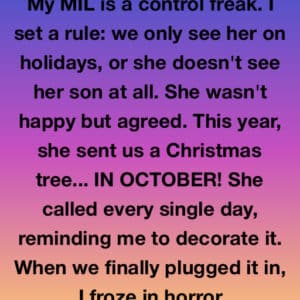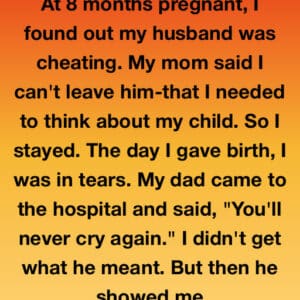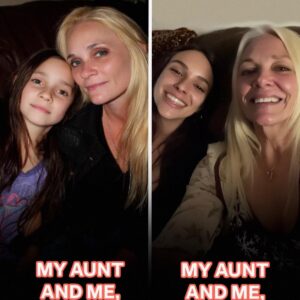They say love makes you blind—and I suppose I was the embodiment of that truth for far too long.
When my husband, Adam, told me he had to quit his job because of a serious illness, I didn’t question it. I didn’t ask for second opinions, and I didn’t doubt his word. I simply believed him—because love is supposed to mean trust. Because he was the man I had stood beside for fifteen years, the man who held our boys when they cried, who once whispered that I was his entire world.
So, I worked harder. Took longer hours. Added a second job in the evenings and handed him every dollar I earned without hesitation, because I thought I was saving him—saving us.
But the truth I discovered not long after shattered something deep inside me. Not just my heart—but my belief in the life I thought I was building.
You marry someone because you believe in a shared future. You believe in the vows you whispered in front of witnesses, when you promised to stand together in sickness and in health. I had meant every word. I would have walked through fire for Adam. And for a while, I believed he’d do the same for me.
Looking back, I can now trace the cracks. Not giant betrayals, just tiny tremors. The way he avoided specifics. How his eyes sometimes shifted when I asked about his treatment plan. How vague he was about his appointments. I ignored those signs. I told myself not to overthink. That love means trusting even when it’s hard.
And so, I did.
Our days were packed. Between my job as a project manager, our two growing boys, and housework, life felt like a constant juggling act. But it was a good kind of busy. Ethan and Noah lit up our home with energy and curiosity.
Ethan, twelve, was our quiet inventor—always with a screwdriver in one hand and a “project” in the other. He was fascinated by how the world worked, just like Adam used to be. Noah, our ten-year-old firecracker, rarely sat still. If he wasn’t racing his bike down the driveway, he was flipping soccer balls in the hallway or begging me to time his sprints.
And Adam? He was my anchor. Or at least I thought so.
He was always steady, calm in a way that balanced the chaos. He read bedtime stories in silly voices, built science fair projects at midnight, and made our sons believe that anything was possible.
So when he came home early one gray afternoon, his face pale and hollow, I didn’t see what was coming.
He sat down, placed a thick folder on the table, and looked at me like the sky was falling.
“I have muscular dystrophy,” he said, voice trembling.
My knees went weak.
The folder contained medical reports, letters from supposed specialists, stamped documents. Everything looked legitimate. I clutched his hands and promised him we’d get through it together. That I would take care of everything, just like he had for us all these years.
I started working nights at a café after my corporate job. I’d clear tables, mop floors, and come home long after midnight, too tired to speak. I gave up little joys—my yoga class, the fancy coffee I loved, evenings with friends. It was all worth it, I told myself. Love was worth the sacrifice.
Adam would thank me often. “You’re incredible,” he’d whisper. “I don’t deserve you.”
No, he didn’t.
He said his treatments were during the week while I was working. That it was better if he went alone—less disruption to our routine.
I never suspected otherwise.
Until a cold evening changed everything.
I was walking to my café shift when a white SUV pulled up beside me. A woman rolled down the window. Her expression was strange—something between pity and urgency.
“Are you Emily?” she asked.
I nodded, confused.
“Is Adam your husband?”
My heart raced. “Yes… why?”
She looked me in the eye. “He’s not who you think he is. You need to check your bank account. And maybe ask him what those ‘treatments’ really are.”
I blinked, stunned. “Who are you?”
“My boyfriend is one of his friends. I overheard enough. I couldn’t stay quiet. You deserve to know.”
And then, she drove off.
That night, I stared at Adam across the dinner table. He talked about his “exhausting therapy session” and how hopeful he was. I nodded, barely hearing a word.
The next morning, after he left for another one of his late appointments, I opened his laptop. My fingers trembled as I typed in his banking password.
What I found hit harder than anything I could have imagined.
No hospital payments. No treatment center deposits. Not a single medical transaction.
What I did see were charges for luxury resorts, designer boutiques, bar tabs, and golf memberships.
Thousands of dollars gone. My money. Our money.
I felt my hands go cold.
I followed him that evening. I parked two blocks away from where he said he’d be getting “treatment.” Instead, I saw him walk into a sleek bar, laughing, confident, whole. Through the window, I watched him raise a glass.
“I told you I could stretch it to three months!” he laughed. “She’s still working two jobs and has no idea.”
A friend replied, “Bro, you’re a legend.”
Adam smirked. “Hook, line, and sinker.”
I felt like I was sinking, too. Drowning in disbelief.
And then I saw the same white SUV from earlier. She rolled down the window again.
“You saw it for yourself?” she asked gently.
I nodded, silent tears running down my face.
“I’m sorry,” she said.
That night, I didn’t confront him. I didn’t throw things or scream. I kissed our boys goodnight, packed their school lunches, and laid in bed staring at the ceiling. My heart wasn’t just broken—it was numb.
But my mind was clear.
The next day, I called Adam’s HR department and told them he was feeling well enough to return to work.
Then I went to the bank, froze our joint account, and transferred what remained into a private account. I paid off our mortgage, secured a fund for our sons, and contacted a lawyer.
When I was done, I sent him one text:
“Adam, your illness isn’t muscular dystrophy. It’s dishonesty. And I’m done carrying it.”
Then I changed the locks, packed my boys into the car, and drove to my parents’ house.
He called. Dozens of times. He begged. Claimed confusion. Claimed love.
But I was done listening to lies wrapped in tenderness.
I filed for divorce the following Monday.
And in the quiet days that followed, I began to breathe again—not easily, not yet—but truthfully. I cried in private. I grieved the marriage I thought I had, the man I believed in. But through the pain, something else emerged.
Strength.
Now, I’m not just surviving—I’m rebuilding. I go to work, take my boys to practice, and pour love into the life we have left. Not the one I lost. The one I chose.
I see my reflection in the mirror and I no longer see a woman broken. I see a woman who believed, who sacrificed, who was lied to—but who rose anyway.
And if that isn’t love, I don’t know what is.





